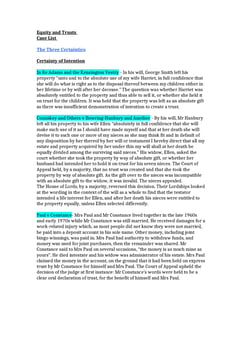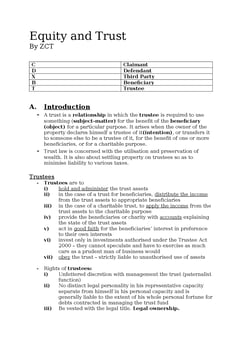Grey v IRC (Inland Revenue Commissioners) [1960] AC 1; [1959] 3 WLR 759; [1959] 3 All ER 603
Judgement for the case Grey v IRC (Inland Revenue Commissioners)
Table Of Contents
KEY POINTS
Revenue and stamp duty law involves complicated considerations in transactions like gifts inter vivos and oral settlements.
Issues arise with settlements favoring grandchildren and transferring company shares to trustees as nominees, posing challenges that require careful examination. Oral directions to trustees regarding shareholdings and subsequent declarations of trust further complicate matters.
The question of whether voluntary dispositions are subject to ad valorem duty is a significant aspect addressed by the Finance (1909-10) Act, 1910 (10 Edw. 7 & Geo. 5, c. 8), section 74. The Law of Property Act, 1925 (15 & 16 Geo. 5, c. 20), section 53 (1) (c) plays a crucial role in shaping the law surrounding these matters, adding complexity to the analysis.
Understanding the principles involved in consolidating and amending acts is crucial when it comes to statutory construction. The Law of Property Act, 1925, section 53 (1) (c) is subject to these rules of construction, which influence the legal interpretation and consequences in the complexities surrounding these matters.
FACTS
In 1949, H established five settlements, benefiting one of his grandchildren. Additionally, a sixth settlement in 1950 encompassed existing and potential after-born grandchildren. The Appellants were appointed as trustees for all these settlements.
On February 1, 1955, H transferred 18,000 ordinary £1 shares to the Appellants as his nominees.
-
Subsequently, on February 18, 1955, H orally directed the Appellants to hold the shares in a specific manner:
5 blocks of 3,000 shares each on the trusts of the 1949 settlements.
3,000 shares on the trusts of the 1950 settlement.
This directive aimed to exclude H from any future rights, titles, or benefits associated with the shares and their income.
-
On March 25, 1955, the Appellants executed six uniform declarations of trust. Although not explicitly stated as a party, H executed each deed, acknowledging:
Holding 3,000 shares in the company.
H's oral direction on February 18 and its nature, as testified by H's deed.
Holding the shares on the trusts of the settlements, ensuring they constituted part of the trust fund.
All six declarations of trust were subject to ad valorem stamp duty as voluntary dispositions under section 74 of the Finance (1909-10) Act, 1910.
JUDGEMENT
-
The court held that H.'s directions regarding the shares constituted dispositions of his equitable interest under section 53 (1) (c) of the 1925 Act.
Because these directions weren't in writing as required by the provision, they were deemed ineffective.
The term "disposition" was interpreted broadly, justifying the ad valorem stamp duty assessment on the declarations.
The Law of Property Act, of 1922, and the Law of Property (Amendment) Act, of 1924, significantly impacted property law. Despite the 1925 Act being consolidating, each word was given its proper meaning.
The Court of Appeal's decision was affirmed.
COMMENTARY
The case involves revenue and stamp duty law issues, focusing on settlements benefiting grandchildren and transferring company shares to trustees with subsequent oral directions. The legal considerations include the Finance (1909-10) Act, 1910, section 74, and the Law of Property Act, 1925, section 53 (1) (c).
In 1949, H established six settlements, appointing appellants as trustees. He transferred shares with oral directions, and declarations of trust were executed, subject to stamp duty based on the Finance Act.
The court held that H.'s oral directions constituted dispositions under the 1925 Act, section 53 (1) (c), but were deemed ineffective due to non-compliance with the writing requirement.
Ad valorem stamp duty on the declarations was justified.
The impact of the Law of Property Act, of 1922, and the Law of Property (Amendment) Act, of 1924, on property law was significant.
For Further Study on Grey v IRC (Inland Revenue Commissioners)

A collection of the best GDL notes the director of Oxbridge Notes (a...
Need instant answers? Our AI exam tutor is here to help.
Ask questions 🙋 Get answers 📔 It's simple 👁️👄👁️
Our AI is educated by the highest scoring students across all subjects and schools. Join hundreds of your peers today.
Get StartedRelated Product Samples
These product samples contain the same concepts we cover in this case.

